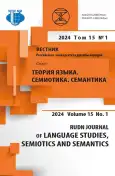Certainty Stance Adverbs in Chinese Linguistic Academic Writing: A Corpus-based Study
- Autores: Dugalich N.M.1, Han H.1,2
-
Afiliações:
- RUDN University
- Zhengzhou Business University
- Edição: Volume 15, Nº 1 (2024)
- Páginas: 248-261
- Seção: DISCOURSE & CORPUS STUDIES
- URL: https://journal-vniispk.ru/2313-2299/article/view/323651
- DOI: https://doi.org/10.22363/2313-2299-2024-15-1-248-261
- EDN: https://elibrary.ru/FPALHU
- ID: 323651
Citar
Texto integral
Resumo
This study delves into the intricate usage of certainty stance adverbs in the academic writings of the Chinese. The object of this study is to conduct a contrastive analysis of certainty stance adverbs between Chinese linguistic MA novices and linguistic experts. The subject of this study is to explore the similarities and differences in the use of these adverbs within the academic discourse of the two groups mentioned. In addressing these disparities, the study seeks to analyze them from the perspective of interlanguage and interpersonal function, with the ultimate goal of enhancing the production of high-quality academic papers by the Chinese. The study employs two key methods: the contrastive analysis method and the corpus-based method. The novelty of the study lies in its contrastive examination of certainty stance adverbs between Chinese linguistic MA novices and experts. Through an in-depth analysis of theoretical frameworks and linguistic data extracted from the MA theses of Chinese linguistic novices and research articles of linguistic experts, the study underscores the importance of considering the similarities and differences in the use of certainty stance adverbs within the realm of second language acquisition and pragmatic studies. This consideration aims to refine learners’ syntactical and pragmatic command of certainty stance adverbs to align with expert academic discourse, ultimately fostering effective interpersonal communication in academic writing. The findings of this research offer valuable insights into the specific linguistic challenges encountered by the Chinese, thereby laying a solid groundwork for the development of targeted pedagogical strategies to bolster their academic writing skills.
Palavras-chave
Sobre autores
Natalia Dugalich
RUDN University
Autor responsável pela correspondência
Email: dugalich-nm@rudn.ru
ORCID ID: 0000-0003-1863-2754
Scopus Author ID: 57194526936
Researcher ID: K-8404-2017
PhD in Philology, Associate Professor at the Foreign languages department, Faculty of Philology; Head of Foreign languages department, Institute of Medicine
6, Miklukho-Maklaya str., Moscow, Russian Federation, 117198Hao Han
RUDN University; Zhengzhou Business University
Email: 1042218192@rudn.ru
ORCID ID: 0009-0004-3832-6660
PhD student at the Foreign languages department, Faculty of Philology, RUDN University ; Lecturer at School of Foreign Languages, Zhengzhou Business University
6, Miklukho-Maklaya str., Moscow, Russian Federation, 117198; 136, Zijing Road, Gongyi City China, 451200Bibliografia
- Wingate, U. (2012). ‘Argument!’ helping students understand what essay writing is about. Journal of English for Academic Purposes, 11(2), 145-154.
- Hyland, K. & Milton, J.C. (1997). Qualification and certainty in L1 and L2 students’ writing. Journal of Second Language Writing, 6(2), 183-205.
- Allison, D. (1995). Assertions and alternatives: helping ESL undergraduates extend their choices in academic writing. Journal of Second Language Writing, 4(1), 1-15.
- Hyland, K. (1998). Hedging in scientific research articles. Amsterdam: John Benjamins Publ.
- McEnery, T. & Kifle, N.A. (2002). Epistemic modality in argumentative essays of secondlanguage writers. In: Flowerdew, J. (Ed.), Academic Discourse. Longman: New york. pp. 182-195. https://doi.org/10.4324/9781315838069
- Zhao, X.L. (2009). Expression of Stance in Chinese Learner English: Stance Adverbs. Journal of PLA University of Foreign Languages, 32(5), 54-59.
- Pan, F. (2012). Stance Adverbs in Journal Articles by Chinese and Native Writers: A Pragmatic View. Journal of PLA University of Foreign Languages, 35(5), 9-12.
- Xu, F. (2015). A Study of Stance Markers in Second Language Academic Writing. Foreign Languages and Their Teaching, 5, 1-7.
- Lancaster, Z. (2016). Expressing stance in undergraduate writing: Discipline-specific and general qualities. Journal of English for Academic Purposes, 23, 16-30.
- Biber, D. & Finegan, E. (1989). Adverbial stance types in English. Discourse Processes, 1, 1-34.
- Biber, D. (2006). Stance in spoken and written university registers. Journal of English for Academic Purposes, 5(2), 97-116.
- Peacock, M. (2015). Stance adverbials in research writing. Ibérica, 29, 35-62.
- Thompson, G. & yiyun, y. (1991). Evaluation in the reporting verbs used in academic papers. Applied linguistics, 12(4), 365-382.
- Hunston, S. (1994). Evaluation and organisation in a sample of academic written discourse. Advances in Written Text Analysis. London: Routledge.
- Hyland, K. (2002). Activity and evaluation: reporting practices in academic writing. In: Flowerdew, J. (Ed.), Academic Discourse. Longman: New york. pp. 115-130. https://doi.org/10.4324/9781315838069
- Biber, D., Johansson, S., Leech, G., Conrad, S. & Finegan, E. (1999). Longman Grammar of Spoken and Written English. London: Pearson Education.
- Hyland, K. (1996). Talking to the academy: Forms of hedging in science research articles. Written communication, 13(2), 251-281.
- Lian, J., Lazareva, O.V. & Lazareva, O.S. (2022). Comparative Analysis of the Russian Adverb чрезвычайно and the Chinese Adverb 非常 in the Meaning of ‘extremely’. RUDN Journal of Language Studies, Semiotics and Semantics, 13(2), 502-517. https://doi.org/10.22363/2313-2299-2022-13-2-502-517
- Biber, D. (2015). Stance and grammatical complexity in conversation: An unlikely partnership discovered through corpus analysis. Corpus Linguistics Research, 1, 1-19.
- Hyland, K. (2004). Disciplinary interactions: Metadiscourse in L2 postgraduate writing. Journal of second language writing, 13(2), 133-151.
- Hyland, K. (2005). Stance and engagement: A model of interaction in academic discourse. Discourse Studies, 7(2), 173 -191.
- Xu, H.L. (2011). Use of Authorial Stance Markers in Research Discourse by Chinese Advanced EFL Learners: A Corpus-based Contrastive Study. Foreign Language Education, 32(6), 44-48.
- Bahns, J. (1993). Lexical collocations: A contrastive view. ELT Journal, 47(1), 56-63.
- Scott, M. (2008). WordSmith Tools 5.0. Oxford: Oxford University Press.
- Liang, Maocheng (2010). Chi-square test and log-likelihood ratio calculation tool. Beijing: China Foreign Language Education Research Center.
Arquivos suplementares









